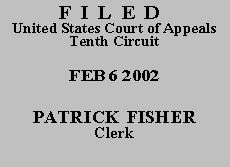

| LORI MCGREGOR,
Plaintiff-Appellant, v. CITY OF OLATHE, KANSAS; BRIAN ALTON, as police officer; N. MOORE, as police officer; D. VOGELSBURG, as police officer; J. LIVENGOOD, as police officer, Defendants-Appellees. |
|
Plaintiff Lori McGregor appeals from an order of the district court granting defendants' motion for summary judgment in this case brought pursuant to 42 U.S.C. § 1983. We affirm.
Ms. McGregor commenced this action after she was arrested by the defendant police officers following a confrontation at a local gas station where she contended she had received impure gas. The defendant officers Alton, Vogelsburg, and Livengood responded to the call from the gas station where Ms. McGregor obtained the gas. Officer Moore was at the jail when Ms. McGregor was brought in. She retrieved the car keys Ms. McGregor had secreted in her pantyhose. Ms. McGregor was found guilty of fleeing arrest, battery on a law enforcement officer, and disorderly conduct. Only the conviction for battery on a law enforcement officer was upheld on appeal.
In this action, Ms. McGregor asserted Fourth Amendment violations because she was seized without cause, the arresting officers used excessive force to arrest her, and Officer Moore performed an illegal search of her person. She alleged her Fifth Amendment rights were violated because she was not read her Miranda rights until she left the police station. She claimed both due process and equal protection violations of her Fourteenth Amendment rights. Ms. McGregor contended the City of Olathe violated her rights by failing to properly supervise and train its officers. Finally, Ms. McGregor raised state law claims of assault, false arrest, false imprisonment, malicious prosecution, abuse of process, and the tort of outrage.
The district court granted summary judgment on all her claims. The court determined that probable cause existed for Ms. McGregor's arrest based on her convictions for disorderly conduct, battery on a law enforcement officer and fleeing arrest. The court further determined that the arresting officers did not use excessive force in effecting the arrest. The court also held that the officers were entitled to qualified immunity and that no liability could be imposed against the city. The court concluded that her state law claims were time-barred.
On appeal, Ms. McGregor argues that material issues of disputed facts exist which preclude summary judgment. She also clarifies that she is dropping her claims of malicious prosecution, unlawful arrest, and battery against the individual officers as well as her claims of illegal search and conspiracy. She continues to assert her claims against the city and contends her state law claims of battery and assault should be reinstated as her notice of claim was timely. She further contends all other claims dismissed by the district court should be reinstated.
We review the district court's grant of summary judgment de novo while examining the evidence and all reasonable inferences to be drawn therefrom in the light most favorable to the nonmoving party. Cooperman v. David, 214 F.3d 1162, 1164 (10th Cir. 2000). Summary judgment is proper if the record shows "that there is no genuine issue as to any material fact and that the moving party is entitled to a judgment as a matter of law." Fed. R. Civ. P. 56(c).
We have reviewed the record and the parties' briefs on appeal, as well as the applicable law. Finding no reversible error, we AFFIRM the judgment of the United States District Court for the District of Kansas. Ms. McGregor's motion to amend her brief is GRANTED. Ms. McGregor's motions to file her reply brief out of time and to file an oversize reply brief are GRANTED. Defendants' motion to strike parts of appendix is GRANTED insofar as the appendix contains documents not presented to the district court. The mandate shall issue forthwith.
Entered for the Court
Circuit Judge
*. This order and judgment is not binding precedent, except under the doctrines of law of the case, res judicata, and collateral estoppel. The court generally disfavors the citation of orders and judgments; nevertheless, an order and judgment may be cited under the terms and conditions of 10th Cir. R. 36.3.